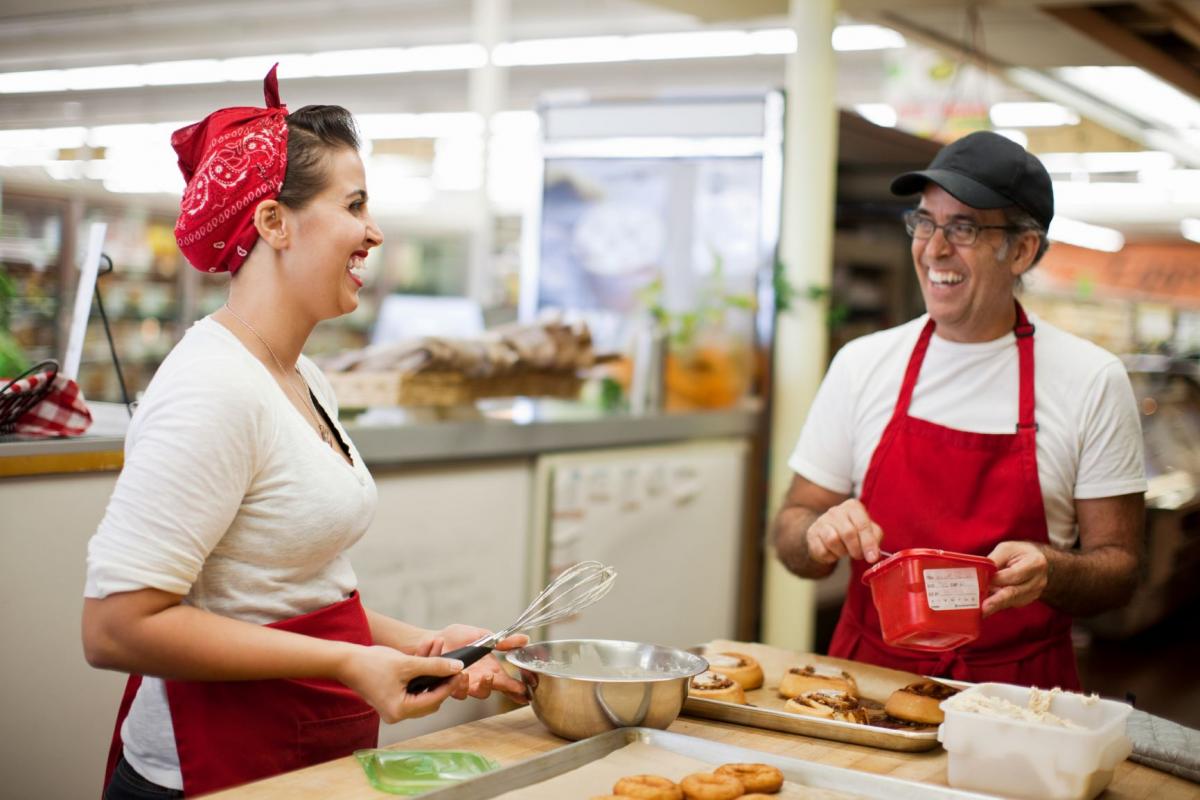Have your friends ever said you should bottle your famous garden-fresh salsa and sell it at the farmers’ market? Or perhaps you’ve seen cupcakes for sale on social media and wondered if they were from a legitimate business? Maybe you’re dreaming about quitting your day job and opening a food truck.
Whether you’re thinking about selling hand-made food items or whether you stick to eating them(!), here’s what you need to know about the health checks that need to be in place before food is put up for sale.
There are around 100,000 cases of foodborne illness in Ontario every year that are due to what we at Public Health call ‘enteric pathogens’, or nasty bugs that affect your gut. Most of the folks who get foodborne illness (which you also might know as ‘food poisoning’) don’t need or seek medical attention. They ride out symptoms like vomiting and diarrhea at home. But some types of illness can cause long-term disorders such as gastrointestinal problems, autoimmune disorders, kidney failure and death.
That’s why Public Health works with food premise operators to lower the risk of foodborne illness. It’s a shared responsibility to protect the public among public health inspectors and food premise owners, operators and employees.
The Health Protection and Promotion Act (HPPA) and accompanying Ontario Food Premise Regulation 493/17 are the legal reasons we do what we do and set out the minimum standards for food safety in Ontario.
New food businesses: what’s needed

How stringent is the process for starting a food business? Here are some of the requirements, which are also available in our printable Smart Start Package.
If you have questions, give one of our public health inspectors a call. We’re here to help!
Step 1: Start out by contacting your local municipality for information about zoning, construction, septic system and business license requirements.
Step 2: Fill out our Notice of Intent to Operate a Food Premises form (PDF, 106 KB). The HPPA legally requires that public health is notified before starting a new food operation.
Step 3: Follow our tips for constructing/building or renovating your kitchen. We can give you advice on things like:
- Flooring and wall material choices that make cleaning easier
- How many and which types of sinks you need for washing hands and dishes
- Whether you should buy steel or wooden shelves
- How to choose a commercial dishwasher that sanitizes effectively
You might also need to contact your local building and fire departments for information about Ontario Building Code requirements.
Step 4: Tell us about your plans! Don’t start building or renovating without giving a public health inspector the chance to review your plans and discuss the proposed menu. The types of food you plan to prepare could affect what equipment and layout is needed.
We’ll want to know:
- Where cooking equipment, handwash sinks and dishwashing equipment will be located
- What materials will be used on the floors, walls and ceilings
- Details about your well water supply (if applicable)
Step 5: Contact your public health inspector at least seven days before opening to arrange a pre-inspection.
Any changes made after this time will have to be approved by us too.
Is that it?
Not at all! These five steps are a starting point to make sure the physical space you use to prepare food is easy to clean and unlikely to cause food safety problems. But what about the actual menu?

There are many guidelines about how food is stored, prepared and served that reduce the risk of foodborne illness.
For example, can you answer these food safety questions?
- What temperature does a hot meal need to be held at while out at a farmers’ market or special event?
- Does it matter where in the fridge you store your raw eggs?
- How do you safely transport food to a special event or farmers’ market?
- What is a sanitizer, and what can I use to sanitize?
- What temperature should a fridge be?
We recommend food safety training and certification for anyone involved in a business who will be handling food. The Ontario Food Premise Regulation specifies that at least one food-handler-certified supervisor or food handler is on site during every hour in which the food premise is operating.
Canned foods

If you plan to do canning, be sure to connect with a public health inspector before you start production. That’s because some canned products are considered high risk for their potential to cause serious foodborne illness, like botulism.
High-risk canned foods include vegetables, chutneys and soups. These need to be pressure-canned to reach the proper temperature to kill botulism spores.
Low-risk canned foods include jams, jellies and vinegar-based pickles/relishes. These may be prepared in a boiling water canner.
Recipes used for canning must be validated by a reputable source and specify:
- Processing time
- Temperature
- Measured ingredients
- Container size
Processed meat
If you’re thinking about processing meat (e.g., to make jerky or prosciutto) call your public health inspector. Depending on what activities you’re carrying out, you might be under the jurisdiction of Public Health or the Ontario Ministry of Agriculture, Food and Rural Affairs (OMAFRA).
Farmers’ markets

We are lucky to have strong local food connections in Wellington County, Dufferin County and Guelph, and part of that means farmers’ markets! Farmers’ markets are places where farm products (like produce and meat), baked goods and preserved foods (think pickles!) are sold, oftentimes by the people who grow or produce them. Before a food vendor can start selling at a market, Public Health must be satisfied that the products and the way they’re served is safe.
Before selling anything at a farmers’ market, the person organizing the market, as well as each individual vendor, must submit an application to Public Health.
Special events

Fairs, music festivals and other events where food vendors sell to the public might need to be inspected by public health.
Similar to farmers’ markets, both the organizers and individual vendors selling food at a special event have to submit an application to Public Health before operating.
Phew!
Is selling that homemade jam more complicated than you thought? That’s why our public health inspectors are here to help you get your ducks (or donuts, or fruit stand) in order before you launch.
If you have any questions about food safety, starting a food business or whether or not a business has been inspected, give us a call at 1-800-265-7293 ext. 4753 or leave a comment below.
